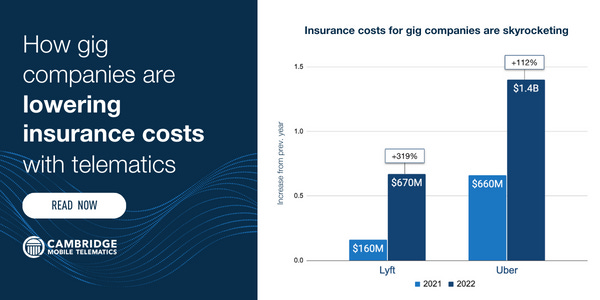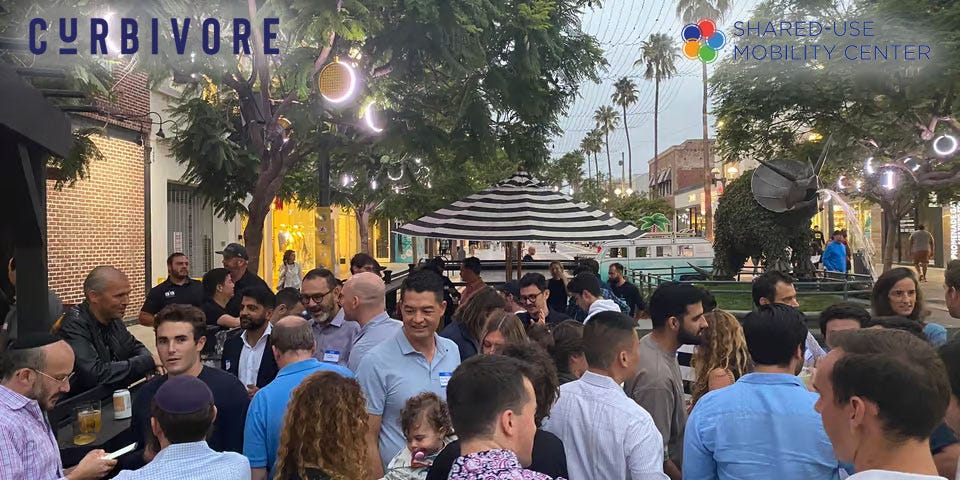Bike-Based Deliveries Take London by Storm
Join us Tuesday for an Arts District happy hour
PARTNER | Save Money and Make Drivers Safer
Auto insurance is the top expense for rideshare companies. Last year, Lyft attributed 90% of its $730M cost of revenue increase to insurance. One insurance carrier doubled its annual premium written for Uber.
To help reduce insurance costs, companies are turning to telematics. They’re making drivers safer through real-time feedback. They’re also rewarding their safest drivers.
Bike-Based Deliveries Take London by Storm
Over at our sister publication OttOmate, we chat with Rich Pleeth, Co-Founder and CEO of London-based Fin. London’s regulatory environment is years ahead of any American city’s, and as such there’s been a big push for pedal-powered delivery companies like his. Fin works with marquee international customers to put big deliveries onto quadcycles, and even out in the burbs is still using an all-EV fleet.
HOT INDUSTRY NEWS & GOSSIP
You’re invited - Tuesday happy hour! Join us and our friends at the Shared Use Mobility Center for a mobility and delivery happy hour, 6-8 PM on Tuesday, in the DTLA Arts District. RSVP now for free.
Earning season, part 1: It’s quarterly earnings season, and Lyft managed to come out ahead of estimates, growing transactions 15% and narrowing its net loss to $12.1 million from $114.3M the year prior. Over at Uber, mobility bookings surged 31%, and delivery bookings grew 5%, with premium Uber One customers driving repeat transactions and improved margins. With this representing its second profitable quarter, the company will likely soon join the S&P 500.
Earning season, part 2: The pure delivery side of things is looking good too, with DoorDash seeing orders grow a whopping 27%, to hit 543 million for the quarter. And in its first quarter as a public company, Instacart saw revenue rise 14% YoY to $746 million. But over a 1-800-Flowers.com, sales dropped 11.4%. Looks like everyone is clamoring for a slice of the curb, except for the florist!
Bye bye commutes: The NYT has an interactive piece charting how much commuting has declined in major American cities (although the data only through from 2022 is a shame.) While car usage has dropped, transit patronage is down even further in every single metro area. Interesting to note the relatively weak recoveries in DC/Boston/Chicago, despite being some of the more transit-oriented cities. Meanwhile, operators should learn from LA bouncing back well, thanks largely to restoring service levels to those found pre-pandemic (while other cities are still whittling away their frequency, for shame…)
If only WeWorked… Speaking of not commuting, WeWork finally filed for bankruptcy, hoping to reorganize its massive debts and cut underperforming leases. The company is bailing on 45 buildings, about half of which are in NYC, along with the Bay Area, SoCal, Philly, Puget Sound, Nashville, Atlanta and Boston. 60% of the buildings it’s exiting are Class B, showing that “quality” real estate will likely ride out the office consolidation wave relatively unscated.
More bikes to share: NYC is bringing more bikes to its Citi Bike system, with 2,800 new manual bikes joining the system and a whopping 20,000 ebikes adding to the fleet. The latter is a big win, as right now electric bikes account for about half of all rides, even though they’re currently just a quarter of the fleet. Sadly, the system isn’t being expanded further into The Bronx, Queens, Brooklyn or Staten Island — leaving pontificators with some serious equity questions. Across the country, Bay Wheels is adding 2,00 new e-bikes, and 55 new stations, as it expands across SF, Oakland, Emeryville and San Jose (that would be a long ride.) MTC is also supporting Lyft to lower both the annual membership and per minute ride fees.
A curbside collab: Automotus and Passport are partnering to streamline curb management. The team-up means Automotus’ computer vision tech will be available on the Passport platform, dramatically increasing the number of cities that can quickly bring their curbs up to date.
Narrow lanes save lives! An important new piece of research from Johns Hopkins quantifies how important street design is to public safety and wellbeing. Among the findings: narrower lanes reduce crashes, speed limits reduce injuries, and repurposing asphalt for greenery is good from an economic and environmental perspective.
VCs ❤️ AVs? Evidently all that bad press isn’t dissuading investors from pumping more cash into the autonomous vehicle ecosystem. May Mobility just raised a fresh $105 million, from NTT, Toyota, BMW, State Farm, Trucks and more. May has taken a relatively less flashy approach, working with smaller cities to run microtransit-style deployments.
Don’t pahk the cah in Hahvahd yahd: Straight out of the Donald Shoup playbook — Boston is looking to create parking benefit districts, where higher fees on street parking not only improve turnover (good for businesses!) but let the city reinvest the revenue in neighborhood beautification (also good for businesses!) Not to be outdone, the MBTA is also launching a Bus Priority Toolkit, as the agency looks to improve reliability and travel time along 26 corridors.
Food for thought: As more and more Americans head to drive-thrus, and restaurants add larger and larger drive-thrus and eliminate dining areas, are the chains responding to consumer preferences, or driving them?
Emerald stoplight city: Seattle becomes the first American city to deploy Google’s “Project Green Light” — an AI-enabled system that aims to cut down in idling by retiming traffic signals. But if the overall result is less stopping and all the more reasons to get in a car, is that really a net positive?
No silver bullet: Houston spent $200 million on a top of the line BRT build out — the Silver Line — which opened a few years ago. Even pre-pandemic, ridership was anemic; nowadays it sees only around 1,000 patrons per day. But while some are quick to blame public transit, perhaps the real issue is the surrounding land use?
Podcast plug! I sit down with Angelo Esposito, CEO of Wisk, to chat about which trends are emerging, and what we can expect to see at next March’s Curbivore. If you tune in, he might have some discounts on tickets. 😉
A few good links: Wonky but important: Houston looks to rebalance its MPO to no longer over-prioritize suburban interests. West Hollywood votes to make all new bike lanes protected. Wonder raises $100M. Meet Canada’s newest light rail line. Revel pulls the plug on moped sharing. Feds kick in a fresh $3.8B in funding to break ground on Tri-State’s Gateway rail tunnel. Getir gobbles up delivery stalwart FreshDirect. Feds dole out $83M for safe streets and roads.
Don’t forget to RSVP for Tuesday’s happy hour!
- Jonah Bliss & The Curbivore Crew







